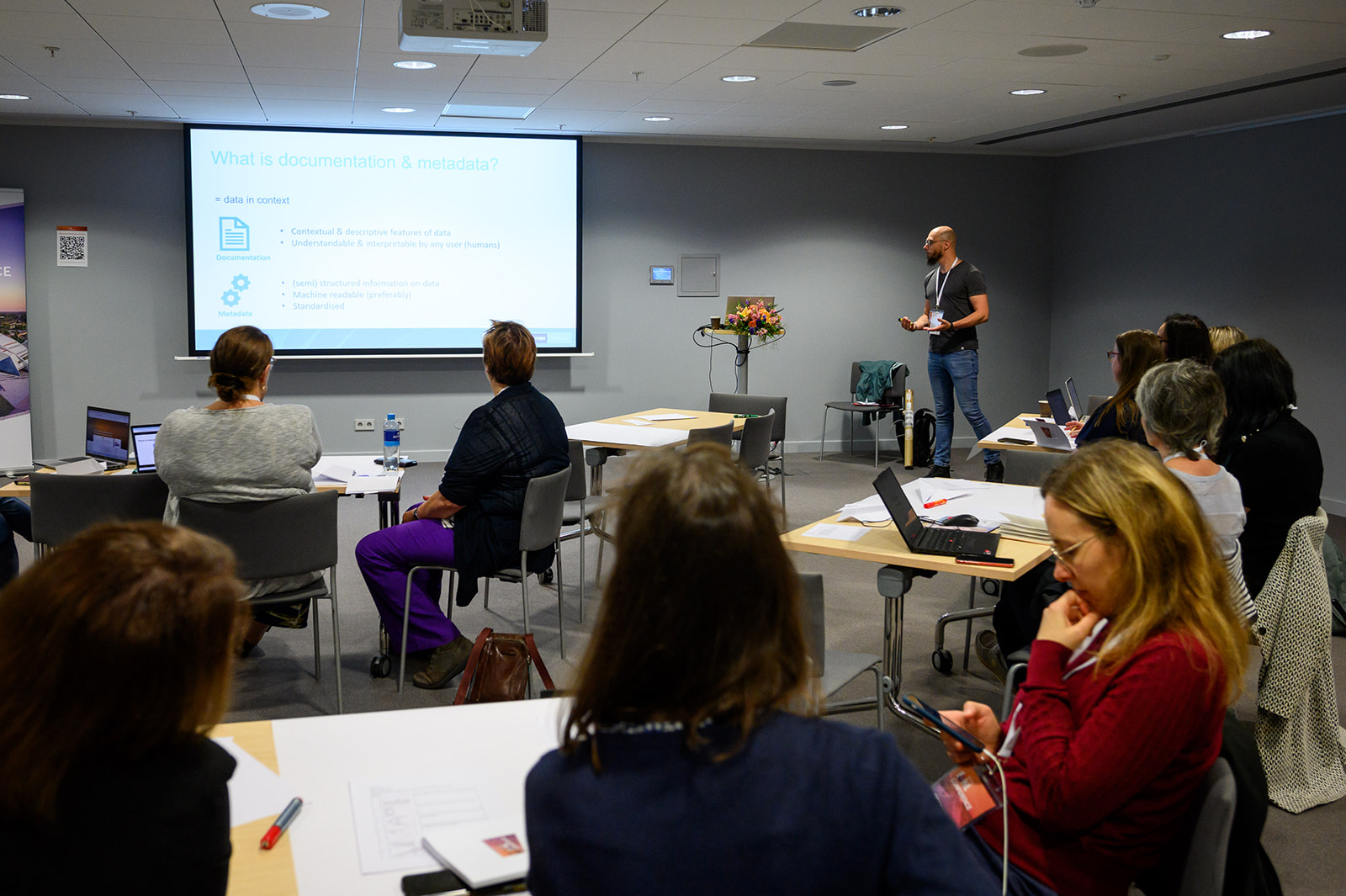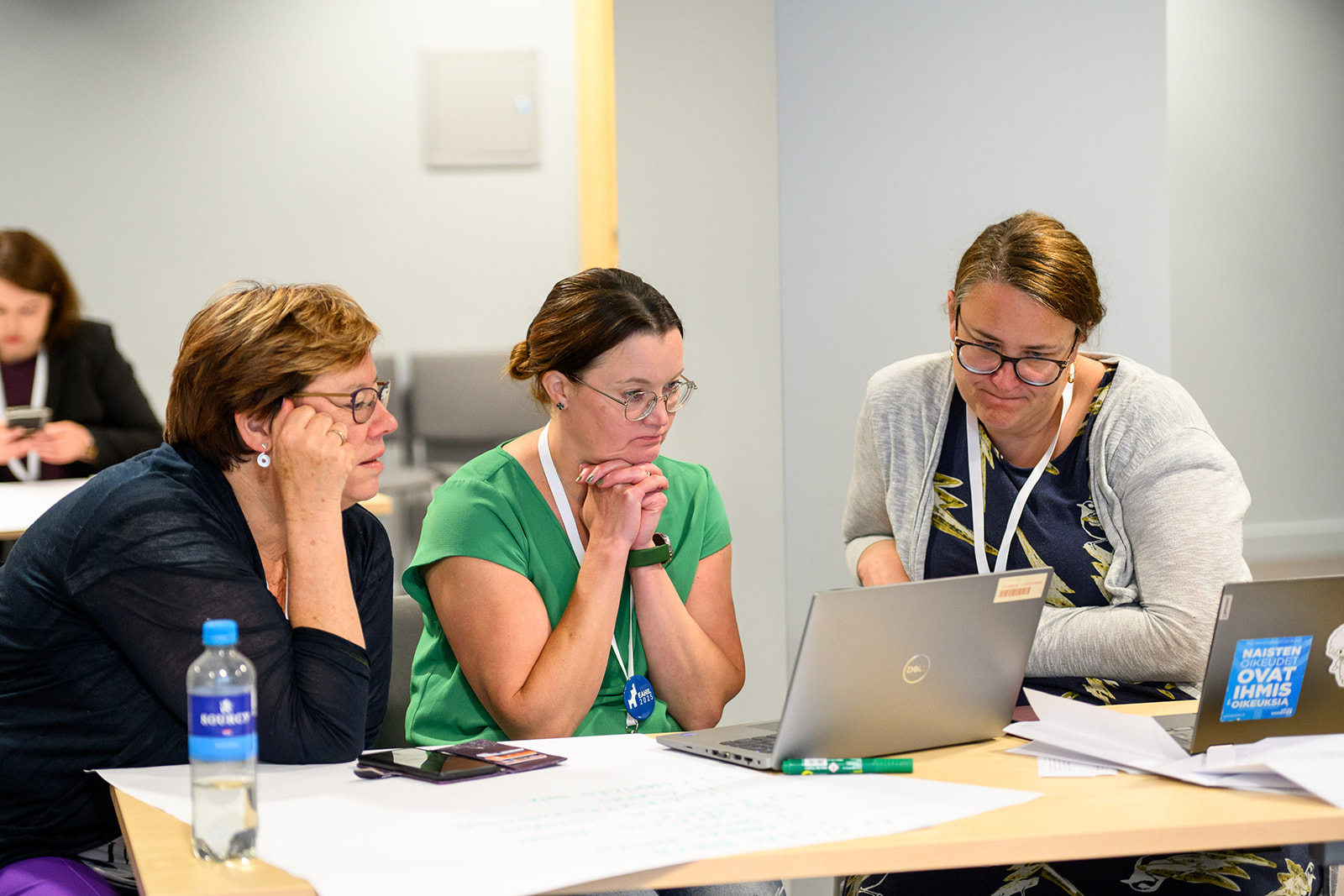Tutkimusdatanhallintaa terveyskirjastojen konferenssissa // Research Data Management at the Conference of Health Libraries
(Please, scroll down to read in English.)
Olipas erinomaisen lämmin ja asiantunteva EAHIL-konferenssi Riiassa, Latviassa kesäkuussa 2024. EAHIL tarkoittaa kansankielellä Euroopan terveyskirjastojen järjestöä eli European Association for Health Information and Libraries. EAHIL järjestää vuosittain joko konferenssin tai workshop-tyyppisen tapahtuman, joihin osallistuu satoja akateemisissa ja sairaaloiden kirjastoissa työskenteleviä informaatioalan ammattilaisia. Tällä kertaa konferenssin aiheena oli ”Small Step and a Giant Leap: Reorienting Towards a New Environment”, joka tarkoittanee laajalla skaalalla sitä, että työympäristömme muuttuu alati digitalisaation myötä. Eikä vain informaatioalalla vaan kaikkialla.
Tässä kirjoituksessa keskityn muutamaan tutkimusdatanhallintaan liittyvään työpajaan, joihin konferenssissa otin osaa. Konferenssi sisälsi myös liudan esityksiä ja postereita mm. tiedonhausta tutkimuksessa, opetuksesta, hyvistä käytänteistä, viestinnästä sekä tietysti tutkimusdatanhallinnasta, joita kaikkia en ennättänyt edes seurata. Tutkimusdatanhallinnan ollessa suuri osuus työtehtävistäni halusin osallistua mahdollisimman paljon siihen liittyviin osuuksiin. Kävin välissä pitämässä myös oman esitykseni datanhallinnan integroimisesta perustutkintokoulutukseen.
Nyt niihin työpajoihin: Ensiksi osallistuin tutkimusdatan kuvailu -työpajaan, Research Data Management @ KU Leuven: Interactive workshop on metadata and documentation, jonka pitivät KU Leuvenin yliopiston tutkimusdataekspertit; Anouk D’Hont ja Thomas Vandendriessche. He kertoivat, millainen sapluuna heillä on tutkijoille pidettävään koulutukseen metadatasta ja dokumentaatiosta. Heillä on tutkijoille esimerkkidata, joka tutkijoiden tulee järjestellä hyvään kuosiin ja suunnitella datalle esimerkiksi hyvä ja selkeä kansiorakenne. Lisäksi tutkijat pääsevät tuon esimerkkidatan avulla miettimään, millaisia hyödyllisiä metadatatietoja on hyvä ottaa ylös datasta, jotta metadata on havainnollistavaa sitä tarkasteleville ulkopuolisille henkilöille eli vaikkapa mahdollisille yhteistyökumppaneille. Tuo esimerkkidata oli todella vaikuttavasti tehty ja sitä hyödynnetään loistavasti tutkijoiden työpajoissa. Hyvää työtä belgialaisilta ja todellakin hyvä käytäntö, jota mekin voisimme UEF datatuen koulutuksissa hyödyntää.
Toinen työpaja oli yleisempi koulutus tutkimusdatanhallinnasta kokonaisuudessaan nimeltään ”Introduction to research data management (RDM) for personal health data”. Sen pitivät Birte Lindstaedt ja Julia Fürst Saksasta (ZB MED – Information Centre for Life Sciences). Tämä työpaja sisälsi suurilta osin minulle tuttua asiaa, mutta keskustelut osallistujien kesken olivat sitäkin hedelmällisempiä. Huomasimme muun muassa sen kuinka lainsäädännölliset seikat ohjaavat datanhallintaa todella eri tavoin eri maissa. Mielenkiintoista ja erittäin opettavaa! Jos haluat lisätietoa näiden työpajojen sisällöstä, ota yhteyttä minuun.
EAHIL-konferenssi Riiassa tarjosi paljon omaa ammattitaitoa kehittävää sisältöä, mutta myös mahtavia verkostoitumismahdollisuuksia. Etenkin käytännön järjestelyt olivat omaa luokkaansa. Oma sovellus konferenssille helpotti osallistujan navigointia sekä verkossa että paikan päällä. Onnittelut siis järjestäjille onnistuneesta konferenssista! Nähdään ensi vuonna EAHIL 2025 workshopissa Puolassa Łódźin kaupungissa 9.-13. kesäkuuta!


I attended the EAHIL conference filled with warmth and expertise in Riga, Latvia on June 2024. EAHIL stands for European Association for Health Information and Libraries. Each year, EAHIL organises either a conference or a workshop type event, attended by hundreds of information professionals working in academic and hospital libraries. This time the theme of the conference was ”Small Step and a Giant Leap: Reorienting Towards a New Environment”, which, I reckon, on a large scale means the fact that our working environment is constantly changing due to digitalisation. Not just in the informational field of work, but everywhere.
In this blog post, I focus on a few research data management workshops that I participated in at the conference. The conference also included a number of interesting presentations and posters on topics such as information retrieval in research, teaching, good practices, communication and, of course, research data management, all of which I had no time to follow, but with research data management, as a large part of my work tasks, I wanted to participate as much as possible in the related sessions. In between, I also gave my own presentation on integrating data management into undergraduate education.
Let’s go into those workshops. First, I participated in a research data description workshop, Research Data Management @ KU Leuven: Interactive workshop on metadata and documentation held by KU Leuven university’s research data experts; Anouk D’Hont and Thomas Vandendriessche. They told how they train researchers on metadata and documentation of research data. They have an example dataset for researchers, which researchers should organize themselves in the training session and for example, plan a good and clear folder structure for the datasets. In addition, researchers can use that example data to think about what kind of useful metadata would be good to write down about the whole data, so that the metadata is illustrative to any external people looking at it, for example potential research collaborators. The example data was made impressively and is brilliantly utilized in their own university’s training for the researchers. Good work from the Belgians and indeed a good practice that we could also use in data support training at UEF.
The second workshop was a more general training in research data management as a whole and called ”Introduction to research data management (RDM) for personal health data”. It was held by Birte Lindstaedt and Julia Fürst from Germany (ZB MED Information Centre for Life Sciences). For me, this workshop included a lot of familiar information, but the conversations among the participants were all the more fruitful. Among other things, we discussed how legal issues steer data management in really different ways in different countries. Interesting and very educational! If you would like more information about the content of these workshops, please contact me.
The EAHIL conference in Riga offered a lot of content to develop one’s own professional skills, but also great networking opportunities and especially practical arrangements were in a class of their own. A dedicated app for the conference made it easier for the participant to navigate both online and on-site. Congratulations to the organizers for a successful conference! See you next year in EAHIL 2025, Łódź, Poland, June 9-13!
Taisa Sallinen, tietoasiantuntija | Information specialist
Opetus- ja tietopalvelut | Training and information services